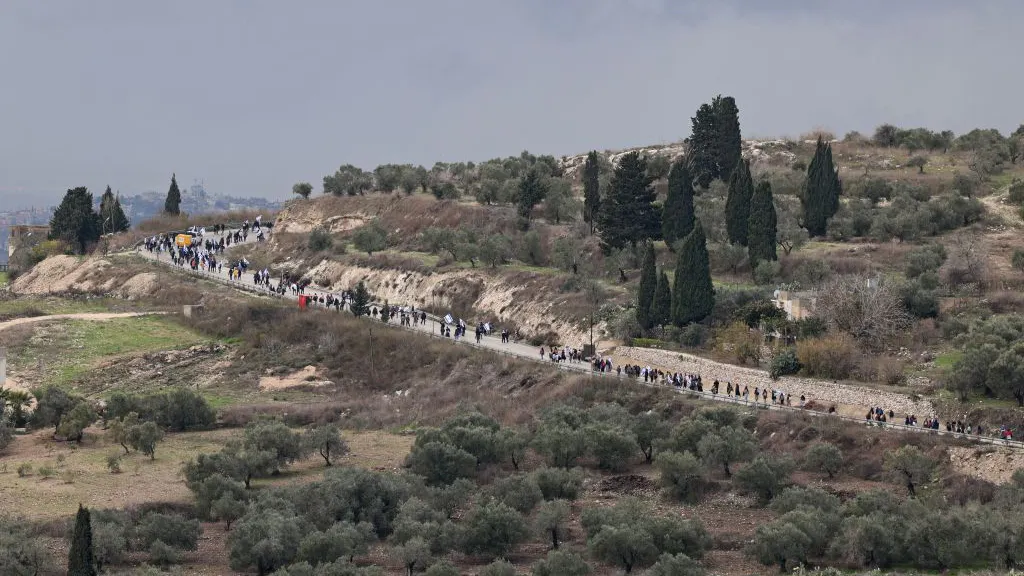Several thousand Israelis from all over the country marched in the pouring rain to the Homesh Yeshiva (religious school) in northern Samaria this past Thursday to honor the memory of Yehuda Dimentman, who was ambushed and gunned down by Palestinian terrorists as he made his way home from the yeshiva on December 16. The demonstrators, estimated between 5,000 and 15,000, as reported by The Times of Israel, stayed well into the night, demanding that the government cancel the planned demolition of the Homesh Yeshiva.
Homesh was one of the communities dismantled by Israel as part of the unilateral disengagement from Gaza and four settlements in northern Samaria in August 2005. According to The Washington Post, the disengagement, which then-Israeli Prime Minister Ariel Sharon undertook, was deeply unpopular with many of Israel’s citizens. Since then, many Israeli politicians have advocated for a return to the area, and former residents and others have visited the ruins of these settlements multiple times in an attempt to rebuild them. Some people reside there clandestinely in makeshift structures. However, because the Disengagement Law has not been repealed, presence in the area could be considered a violation of the law.
The yeshiva in Homesh was opened in 2003 and after the disengagement briefly relocated. In 2007, the Dean, Rabbi Elishama Cohen, and a few students returned to Homesh and reopened the yeshiva. While the yeshiva has been closed down and destroyed by the IDF multiple times, the students kept coming back. For the most part, the yeshiva has been quietly operating for the last 15 years with an average of 50 students.
On Thursday, December 16, six Palestinian terrorists, some of whom had reported ties to Islamic Jihad, ambushed students leaving the yeshiva and shot and killed Yehuda Dimentman, 25, and injured two others. Dimentman leaves behind a young widow and a young baby boy.
Following the attack, the IDF immediately set up an improvised checkpoint and blocked Jewish access to Homesh. Shmuel Wendy, a member of the yeshiva, told Arutz 7 News that “This is an inconceivable absurdity. It is simply a reward for terrorism. Instead of an appropriate Zionist response, the army wants to evacuate the settlement in response to the murder. The people of Israel will not let this happen.”
In response to the blockade by the army, settlers in Homesh erected additional makeshift buildings, naming them after the slain student. The next morning, Border Police and Army units destroyed these buildings.
Public Security Minister Omer Bar Lev told KAN Radio that he believed the settlement should be evacuated. “What is illegal must be dealt with,” he said. Rumors of IDF plans to evacuate the students and destroy the yeshiva were made public, further angering Israelis who were incensed at the injustice of the response, as it seemed to reward the terrorists.
More than 100 rabbis wrote a letter calling on the government not to destroy the Homesh Yeshiva: “We beg you: Do not uproot the yeshiva in Homesh! The vile murder was intended to uproot the Jewish settlement in Homesh. Do not help the murderers fulfill their purpose and give a reward to our enemies!” The letter was signed by a number of the leading rabbis of religious Zionism, including Rabbis Chaim Druckman, Dov Lior, Zvi Yisrael Thau, Yaakov Ariel, and Chaim Steiner.
Ettya Dimentman, widow of Yehuda Dimentman, called on the government to legalize the Yeshiva of Homesh as a tribute to her husband. “Yehuda did not leave me a will. Yesterday a friend of his showed me that they asked him six and a half years ago what he would do if he had only a week left to live, he replied – ‘study Torah in Homesh.’ This is his will,” she said.
However, on Wednesday, December 18, in a 59-50 vote, the Israeli government rejected a declaration to legalize the Homesh Yeshiva. The IDF then arrested the dean of the Homesh Yeshiva, Rabbi Elishama Cohen, for violating the Disengagement Law, which technically prohibits Jews from entering the demolished communities that were disengaged from. It was the first such arrest under this law in many years, and it had never been utilized in a case since 2005. Students at the yeshiva charged the government with nitpicking and politicizing the law.
Thousands marched in protest of the government’s actions, demonstrating that the Israeli population is strongly opposed to it.
MK Orit Strook described to Arutz 7 News the excitement she felt at the sight of the many thousands who came with their entire families, including small children, “The issue of Homesh has touched so many hearts and is important to the people of Israel who say here something very obvious: We are not giving up this place.”
MK Simcha Rotman added: “There is a very strong public statement here, and it must persist. Homesh is the correction to the sin of the disengagement.”
Even from within the coalition there seems to be growing support for the yeshiva to stay. Justice Minister Gideon Sa’ar told Ynet on Tuesday, “There is an extremist terrorist organization here that murdered and things will be interpreted if the yeshiva is evacuated as an achievement for that terrorist organization.” Sa’ar added, “The yeshiva, if they have classes there, does not constitute a new settlement, so there really is no conflict with the law here.”
This video by Ezri Tubi of today's demonstration shows clearly:
Israelis stand with #Chomesh & Samaria is Jewish forever pic.twitter.com/wfsNN6AKV4— Yishai Fleisher يشاي ישי פליישר 🕎 (@YishaiFleisher) December 23, 2021
Today's Homesh march of thousands at end of the Shiva for murdered-by-Arab-terror Yehudah Dinmenton pic.twitter.com/VfuQklhqSh
— Yisrael Medad (@ymedad) December 23, 2021
Tens of thousands of Jews in Israel braved heavy rains and other challenging weather conditions to march to the funeral for Yehuda Dimentman in Chomesh, Samaria. May his memory be a blessing. That yeshiva now must be legalized. https://t.co/PAi8l2VgYj
— Dov Fischer (@DovFischerRabbi) December 24, 2021

.png)
.png)

